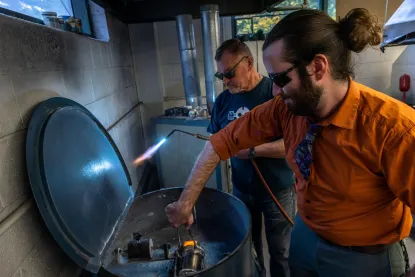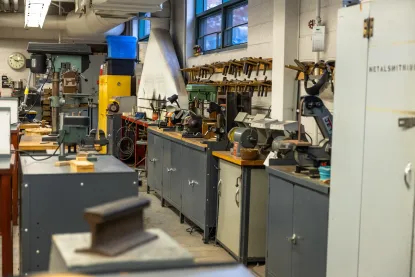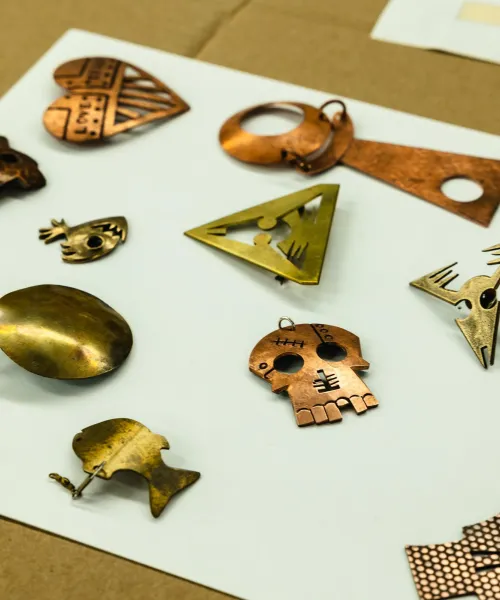Quick Links

About the Program
The metalsmithing/jewelry program at NMU exposes students to a wide range of contemporary metals processes and techniques. Students develop problem-solving skills through hands-on practice in fabrication, casting, mold making, forging, forming, welding, and foundry work. Individual interests guide research in areas such as jewelry, blacksmithing, hollowware, and sculpture, allowing students to develop a personalized and professional body of work.
The curriculum emphasizes the materialization of ideas through diverse methods and media. Students explore concept-driven projects that can take the form of objects, installations, representations, or performances. Coursework provides exposure to specific technologies and encourages students to take courses across the department to support their studio work. The program is designed to help each student develop an individualized path to solve unique creative challenges.
ARTD 216 Sculpture: Foundations
4 credit hours
Offered: Fall
An introduction to methods of synthesizing form in the production of sculpture. Process, techniques, design and composition will be emphasized in assigned projects throughout the semester. Mixed media.
ARTD 223 Jewelry/Metalsmithing: Foundations
4 credit hours
Offered: Fall, Winter
An introduction to the skills required to fabricate jewelry and small metal objects. Traditional techniques of sawing, soldering, hammering, texturing, and casting will be presented. Students will design and fabricate assignments from sheet and wire copper, brass, and nickel silver. All materials and tools are provided in the studio.
AD 323A Production Casting and Mold Making
4 credit hours
Offered: Fall, odd-numbered years.
Prerequisite: AD 101 or AD 209 or AD 210 or AD 222 or AD 223 or AD 224, or instructor permission.
Production casting and mold making for small metal outcomes: jewelry/ sculpture. Individualized research of centrifugal, vacuum, and gravity casting in combination with room temperature and vulcanized rubber molds.
AD 323B Sheet Metal Forming
4 credit hours
Offered: Winter, odd-numbered years
Prerequisite: AD 101 or AD 209 or AD 210 or AD 222 or AD 223 or AD 224, or instructor permission.
This course introduces sheet metal forming techniques, including raising, sinking, folding and fabrication. Each student will produce a portfolio of finished works utilizing these techniques.
AD 323C Blacksmithing
4 credit hours
Offered: Winter
Prerequisite: AD 101 or AD 209 or AD 210 or AD 222 or AD 223 or AD 224, or instructor permission.
Development of skills and knowledge of basic blacksmithing in the production of utilitarian and non-utilitarian forged objects. Beginning with advanced techniques of forging hot steel is presented.
AD 323D Foundry Bronze and Aluminum Casting
4 credit hours
Offered: Winter, even-numbered years
Prerequisite: AD 101 or AD 209 or AD 210 or AD 222 or AD 223 or AD 224; or instructor permission.
Development of skills and concepts in the production of sculpture using the techniques of foundry style, investment bronze, and aluminum casting. Concentration is focused on learning various methods of casting, mold preparation, venting, gating, and investing for gravity pour procedures. Students will also learn the operation of the kiln, furnace, and pouring procedures.

Metalsmithing/Jewelry Studio
The Metalsmithing/Jewelry studio provides students with the tools, equipment, and workspace necessary to explore a wide range of processes. Students have access to facilities for general fabrication, gas and oxygen soldering, and raising and forming sheet metal. The studio also supports production casting and mold making, forging, blacksmithing, welding and fabrication, and foundry casting.
Metalsmithing/Jewelry FAQ
The Bachelor of Fine Arts (BFA) in Metalsmithing/Jewelry is a professional studio degree with more credits in the program and additional studio requirements, including Sculpture, Metal, and related studio courses. It also includes more art history courses and does not allow a minor.
The Bachelor of Arts (BA) and Bachelor of Science (BS) degrees are more flexible, allowing students to combine their major with a minor, such as Business or another area of interest. The BA also includes a world language requirement.
If you are accepted to the university, you may pursue a degree within the School of Art & Design. A portfolio review is not required for admission; however, all Art and Design majors must complete a faculty review of their work through AD303: Individual Art Review. The review is held in the twelfth week of each semester.
For information on general University admission requirements, contact the Admissions Office.
Take an entry-level course to explore your interest. Many Metalsmithing/Jewelry majors had little or no hands-on experience before their first class. The program is designed to start with foundational skills in materials and processes and build upon them each semester, so prior experience is not required.
No. Many courses provide a toolkit at the beginning of the semester that can be used in the studio or taken home. In other courses, tools can be checked out on an hourly or daily basis from an office open whenever the studio is available.
The program provides the tools and equipment needed to complete assignments, so students are not required to purchase tools throughout their undergraduate studies. Consumable items such as drill bits, rotary abrasives, burrs, and polishing supplies may need to be purchased.
Graduates with an emphasis in metalsmithing/jewelry can pursue careers in a variety of fields, including jewelry design and fabrication, blacksmithing, welding, production casting, foundry work, and sheet metal fabrication. Many also establish their own studios to create and sell artwork, jewelry, or functional objects through galleries, art fairs, or online platforms.
The program focuses on developing a broad set of technical skills and creative problem-solving abilities, giving students the versatility to adapt to different professional settings. Over four years, students gain the experience, confidence, and professional mindset needed to succeed in both traditional and entrepreneurial roles in the metals industry.
Metalsmithing/jewelry can be physically involved, but it is not inherently dangerous. No student has ever left the program solely for these reasons. Success in the program requires motivation, a willingness to work in the studio, and a strong work ethic. All techniques are thoroughly explained, and safety procedures are carefully covered before every assignment, ensuring students can work confidently and safely.
For information about scholarships for incoming freshmen, please visit the Scholarships & Financial Aid page.
